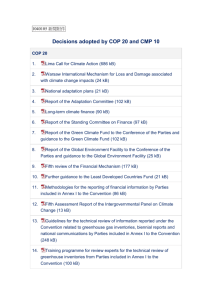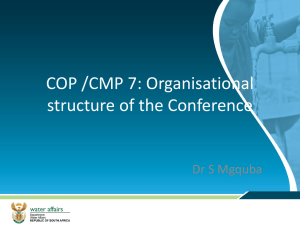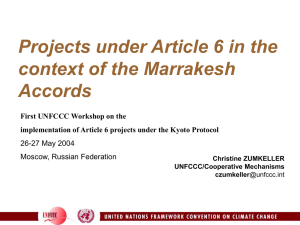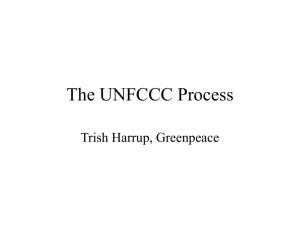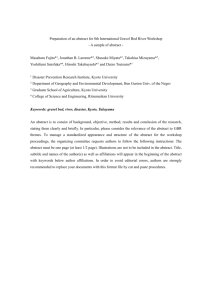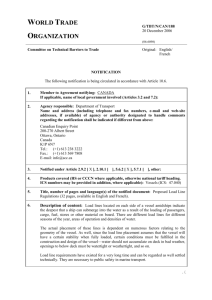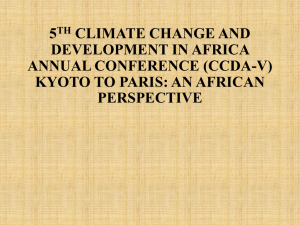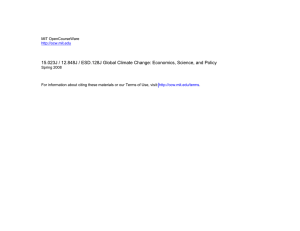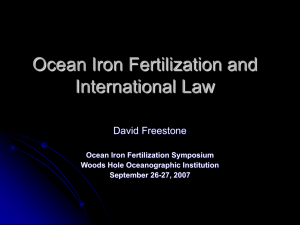Climate Change Acronym Soup Magic Decoder Ring
advertisement
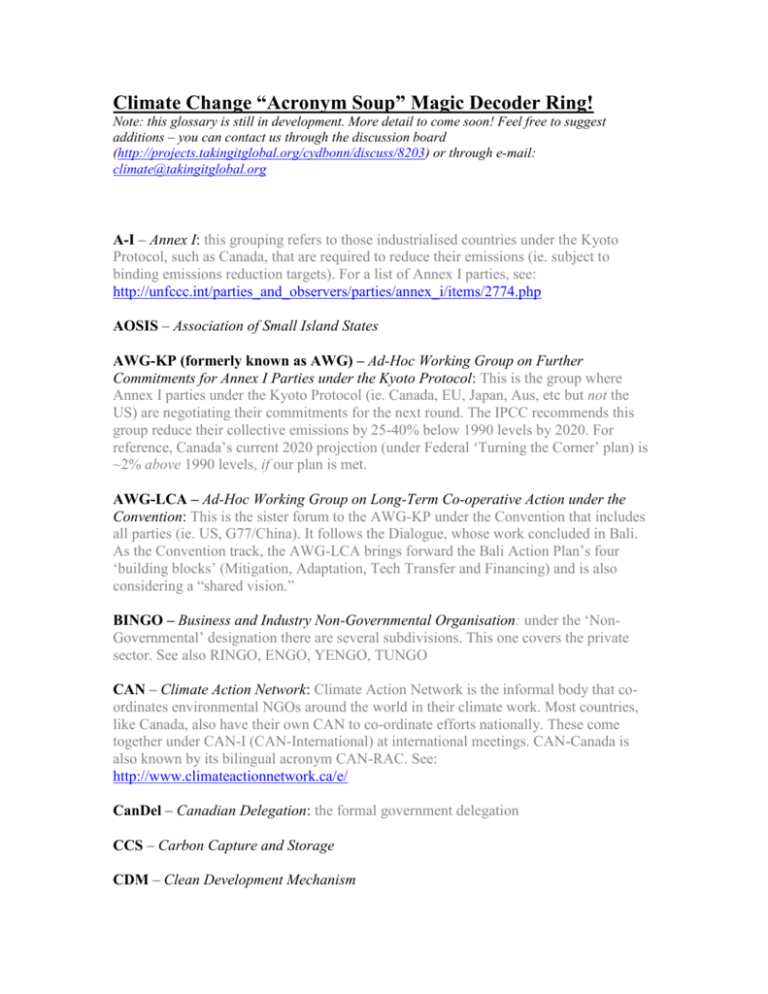
Climate Change “Acronym Soup” Magic Decoder Ring! Note: this glossary is still in development. More detail to come soon! Feel free to suggest additions – you can contact us through the discussion board (http://projects.takingitglobal.org/cydbonn/discuss/8203) or through e-mail: climate@takingitglobal.org A-I – Annex I: this grouping refers to those industrialised countries under the Kyoto Protocol, such as Canada, that are required to reduce their emissions (ie. subject to binding emissions reduction targets). For a list of Annex I parties, see: http://unfccc.int/parties_and_observers/parties/annex_i/items/2774.php AOSIS – Association of Small Island States AWG-KP (formerly known as AWG) – Ad-Hoc Working Group on Further Commitments for Annex I Parties under the Kyoto Protocol: This is the group where Annex I parties under the Kyoto Protocol (ie. Canada, EU, Japan, Aus, etc but not the US) are negotiating their commitments for the next round. The IPCC recommends this group reduce their collective emissions by 25-40% below 1990 levels by 2020. For reference, Canada’s current 2020 projection (under Federal ‘Turning the Corner’ plan) is ~2% above 1990 levels, if our plan is met. AWG-LCA – Ad-Hoc Working Group on Long-Term Co-operative Action under the Convention: This is the sister forum to the AWG-KP under the Convention that includes all parties (ie. US, G77/China). It follows the Dialogue, whose work concluded in Bali. As the Convention track, the AWG-LCA brings forward the Bali Action Plan’s four ‘building blocks’ (Mitigation, Adaptation, Tech Transfer and Financing) and is also considering a “shared vision.” BINGO – Business and Industry Non-Governmental Organisation: under the ‘NonGovernmental’ designation there are several subdivisions. This one covers the private sector. See also RINGO, ENGO, YENGO, TUNGO CAN – Climate Action Network: Climate Action Network is the informal body that coordinates environmental NGOs around the world in their climate work. Most countries, like Canada, also have their own CAN to co-ordinate efforts nationally. These come together under CAN-I (CAN-International) at international meetings. CAN-Canada is also known by its bilingual acronym CAN-RAC. See: http://www.climateactionnetwork.ca/e/ CanDel – Canadian Delegation: the formal government delegation CCS – Carbon Capture and Storage CDM – Clean Development Mechanism CDM EB – Clean Development Mechanism Executive Board: The governing body of the CDM. The EB is responsible for approving projects. CMP (formerly known as COP/MOP) – Conference of the Parties serving as Meeting of the Parties: This is the supreme body of the Kyoto Protocol. It meets annually in conjunction with the COP (supreme body of the Convention). Recent meetings: Montreal-2005, Nairobi-2006, Bali-2007, Poznan-2008, Copenhagen-2009). CoP – Conference of the Parties: This is the supreme body of the Convention. It meets annually alongside the CMP. (See above) CYD – Canadian Youth Delegation: The CYD is self-organised, non-partisan project of the Canadian Youth Climate Coalition which seeks to represent Canadian Youth at international meetings. First organised to Nairobi in 2006, the CYD worked as an official project of the CYCC for the first time for CYD-Bali in 2007 (see www.cydbali.org). Planning is now underway for CYD-Poznan! CYCC – Canadian Youth Climate Coalition: an incredible constellation of Canadian youth and youth-led/youth-serving organisations from various backgrounds right across the country. See www.ourclimate.ca EIT – Economies in Transition ENB – Earth Negotiations Bulletin: Daily reporting from the negotiation sessions, courtesy of the IISD (another acronym!) summarised in a newsletter the following day. Very dry, but extremely factual and useful for maintaining a good overview of fastmoving events. See: http://www.iisd.ca/climate/sb28/ ENGO – Environmental NGO EU – European Union G77/China – Group of 77 and China: this is the main developing country negotiating bloc. It is currently chaired by Antigua and Barbuda. IPCC – Intergovernmental Panel on Climate Change: the scientific body established to collect and synthesize the world’s best research on climate change. Its work on the Fourth Assessment Report (AR4) recently won the Nobel Prize. All reports, including the moredigestible Summary For Policymakers (SPM) versions can be found online: www.ipcc.ch. The IPCC is divided into three working groups. I: Science, II: Impacts and Vulnerability, III: Mitigation. KP – Kyoto Protocol: For a great background, see Caring For Climate (UNFCCC, 2005), available on-line LULUCF – Land-Use, Land-Use Change and Forestry: this is the general term for forest issues. Pronounced “loo-loo C.F.” MRV – Measurable, Reportable, Verifiable NAPA – National Adaptation Programme of Action NGO – Non-governmental Organisation QELRO – Quantified Emissions Reduction or Limitation Obligation: a mandated ‘hard cap’ REDD – Reducing Emissions from Deforestation and Degradation RINGO – Research Institution NGO SBI – Subsidiary Body on Implementation: one of the two subsidiary bodies to the CoP. Focuses on issues such as compliance SBSTA – Subsidiary Body on Scientific and Technological Advice: the second subsidiary body to the CoP. SDPAM – Sustainable Development Policies and Measures SIDS – Small Island Developing States TUNGO – Trade Union NGO UNFCCC – United Nations Framework Convention on Climate Change YENGO – Youth Environmental NGO
